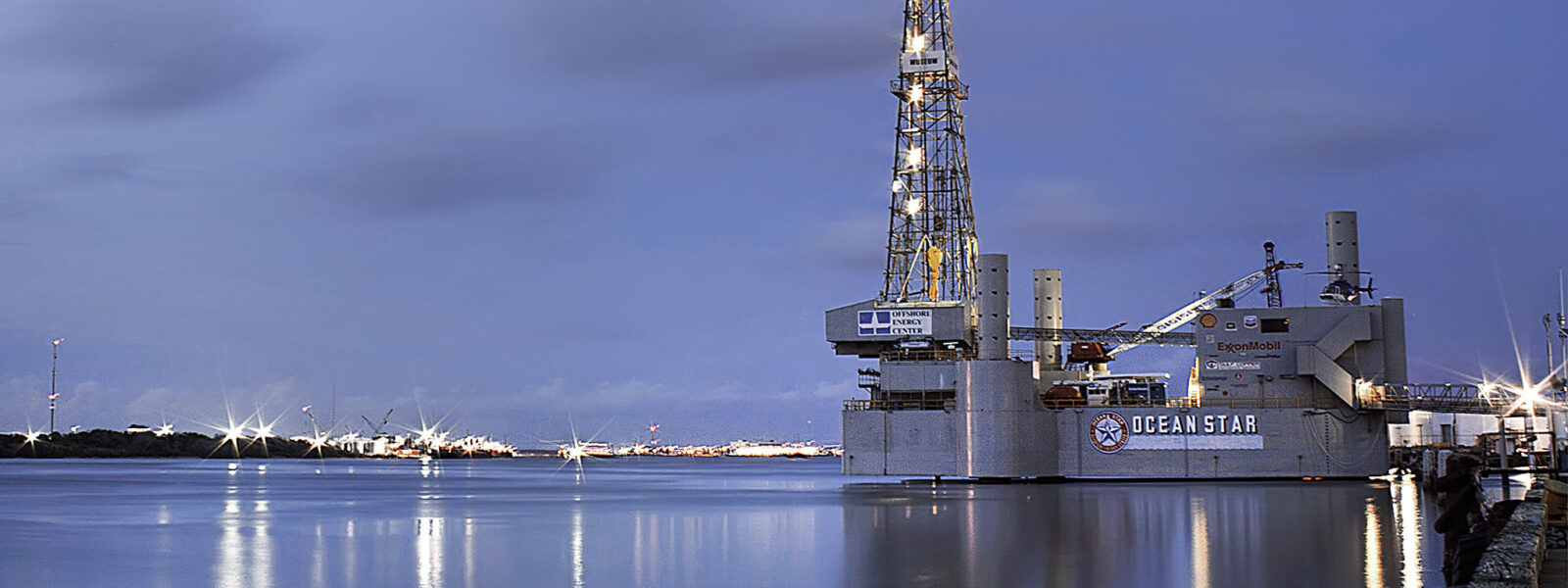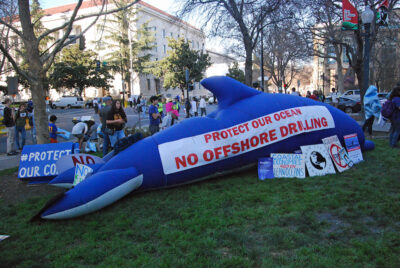
Was the Public Properly Informed of BOEM's New OCS Program?
Erin Murphy is an intern at the International Marine Mammal Project of Earth Island Institute and a new graduate from the University of California, Berkeley.
The Bureau of Ocean Energy Management (BOEM) has been scrambling since 2017 to carry out the federally required procedure of holding scoping meetings in an efficient and constructive manner. Created in 2010, BOEM is a bureau within the Department of the Interior, which manages the Outer Continental Shelf (OCS) energy and mineral resources. For the past two years, they have been busy implementing President Trump’s America-first policies (nicknamed by the Administration “American Energy Dominance”), and most importantly the new National OCS Program.
America’s OCS is a huge expanse of ocean, about two hundred miles out from every shoreline in the US (including Alaska). This area holds potential oil reserves, although the biggest reserves are already being drilled in the Gulf of Mexico and few other patches. Much of the area was put off limits to offshore oil drilling, particularly the Atlantic and Pacific coasts and some part of the Arctic, due to environmental concerns, by previous Congresses and Presidents. The Trump Administration in its zeal is trying to throw all those oil drilling closures out, rushing to lease as much territory as possible.
In April of 2017, Trump issued Executive Order 13795, which details an America-First Offshore Energy Strategy. Subsequently, Secretary of the Interior Ryan Zinke announced Secretarial Order 3350, which directed BOEM to develop a new Outer Continental Shelf Oil and Gas Leasing Program (National OCS Program). This new program for 2019-2024 proposes opening up more than 90% of the OCS to oil and gas development, while the previous 2017-2022 program kept almost 94% of the OCS protected from human interference. If finalized, this would be the largest lease sale in U.S. history.
The first step for BOEM in the multi-year process of establishing a new National OCS Program is publication of a Draft Proposed Program (DPP). The 2019-2024 Program states that there could be 47 lease sales in 25 of the 26 planning areas: 9 off the coast of Alaska, 7 in the Pacific Region, 12 in the Gulf of Mexico, and 9 in the Atlantic Region. With this information, BOEM must legally provide the public ample opportunity to comment, and they must effectively record and summarize those comments before further consideration of the project.
This is done through scoping meetings, which should ideally be planned far in advance and consist of knowledgeable staff members who can effectively communicate information. Furthermore, the meetings are intended to provide information from the public for BOEM and the Administration, rather than a lame excuse for promoting the Administration’s political agenda. However, upon visitation to the Sacramento meeting, members from the International Marine Mammal Project (IMMP) at Earth Island Institute saw reason to file a FOIA (Freedom of Information Act) request with BOEM, in order to obtain any documents related to these National OCS Program Public Meetings. These documents include visitor logs, staff attendance, planning and preparation for meetings, materials and presentations, meeting memorializations, transcripts and summaries of public comments.
Mark J. Palmer, Associate Director of Earth Island Institute’s IMMP, remarks, “The BOEM scoping meetings were clearly set up to avoid hearing from the public, and instead consisted of disjointed ‘information’ and useless round-table ‘discussions’ that weren’t recorded, effectively shutting off any objections to the dangers of offshore oil drilling. BOEM should have LISTENED to the public, rather than running a shell game of misinformation.”
What IMMP found upon receiving the FOIA documents is a heap of miscommunication and disorganization within the BOEM staff. To begin, BOEM had a strict deadline of March 9, 2018, to complete every public meeting, but the planning did not start until November 2017. This simply was not enough time to plan meetings that would take place all over the nation, with the first one scheduled for January 16th in Annapolis, Maryland.
BOEM frequently had venue or security concerns arise, causing last minute stress about where to hold meetings. It did not seem to matter greatly if they had high attendance from the public at these meetings, because BOEM failed to advertise and accommodate to people as best they could. For example, the Sacramento meeting was scheduled to take place at the same time as a California Coastal Commission meeting which key stakeholders would be attending, yet BOEM did not reschedule. They claimed they had too high an RSVP count to move it, but it was significantly less than most other public meetings, such as the Environmental Protection Agency’s session regarding repeal of the Clean Power Plan, which had hundreds in attendance. In addition, BOEM was under pressure to finish all meetings by the early March deadline, and felt they could not afford to push this meeting back.
Once the meetings actually took place, there was consistent confusion regarding the counts of attendees at meetings. In multiple cases, BOEM staff wanted to “fudge” the numbers of people who attended because they had not accurately recorded them at the time of the meetings. In some cases, they suggested increasing the numbers by four times as much as what they actually had record of, which is a significant inflation, even for a rough estimation. BOEM frequently mixed up the attendance records they did possess, which we can see from their distressful email exchanges attempting to understand which numbers belong to which event. For example, the Tacoma, Anchorage, and Olympia meeting sign-ins all got mixed up, and there was no concrete confirmation that they sorted those out. BOEM should have prioritized recording attendance, so that they can understand which issues gain the most traction with public interest. These meetings could have had significantly greater attendance numbers, had they been planned and executed in an organized manner.
Many people have opinions about offshore drilling, especially when it concerns over 90% of the OCS, so these meetings were important and should have been prioritized by BOEM last year. Clearly, they were not, which we have seen through the constant change and confusion among staff members, as well as disregard for accurately recording the attendance of each meeting. The process of holding scoping meetings exists for the sole purpose of hearing the public’s voice, yet in no way was that a goal for BOEM. Subsequently, the meetings were not well-run, the staff were not prepared, and the public’s comments not accurately recorded. This demonstrates the importance of FOIA, wherein we can hold our government accountable for their actions, however we must continue to put pressure on those in power to consider the public voice in a viable way.
The impact of offshore oil drilling on the ocean environment can be devastating. Offshore oil rigs produce loud drilling noises, as does the use of towed arrays of airguns blasting sound into the ocean bottom to detect oil-bearing sediments from return echoes. Huge oil spills are possible that poison the seas for years and kill dolphins, sea otters, marine birds, and many other species as well as smothering the benthic environment. Small spills are a chronic problem from offshore platforms, as are routine dumpings of drill muds from the platforms that contain toxins that enter the water. Not to mention the burning of the oil when it is processed, which contributes significantly to global warming.
The Trump Administration OCS plan is wrong-headed and out of sync with the economies and enjoyment of coastal areas by the public. Offshore oil drilling should be phased out in favor of clean power sources.
* IMMP also submitted a FOIA to the Office of the Secretary of the Department of Interior related to its public outreach efforts, and meetings with third parties, regarding the National OCS Program. The Office of the Secretary failed to respond and IMMP with Earth Island Advocates, represented by Georgetown Law’s Institute for Public Representation, ultimately filed a lawsuit under FOIA.

IMMP’s inflatable blue dolphin went on the march in Sacramento protesting offshore oil drilling during the BOEM meeting. Photo by Mark J. Palmer/IMMP.
